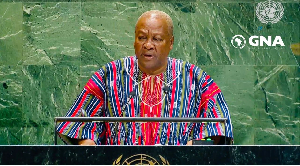Accra April 5, GNA - A combination of Artesunate and Amodiaquine would soon replace chloroquine as a drug of choice in the treatment of malaria cases, a Ghana Health Service (GHS) official said on Tuesday. This is expected to meet the World Health Organization (WHO) standards, which recommend the use artemisinin combination of drugs in treating malaria cases.
The first consignment of the drugs to be imported through the Global Fund is expected to arrive in the country this month, Dr Mrs Constance Bart-Plange, National Malaria Control Programme Manager, said.
Dr Bart-Plange, who made this known at a GHS monthly health promotion talk held in Accra, said Chloroquine, which was used in treating malaria would be phased within a year.
She said Chloroquine resistance had exceeded 25 per cent hence the need to look for other potent drugs.
Speaking on Ghana's moves to adopt a new anti-malaria drug policy, Dr Barte-Plange said in severe malaria cases, parental quinines would be administered while Sulfadoxine-Pyrrimethamine would be offered to pregnant women affected by malaria.
Dr Barte-Plange said the use of artemisinin-based combination had distinct advantages stressing that it had no documented parasite resistance and had proved to be very effective in treating malaria cases.
Giving an overview of malaria cases in the country, she said the disease recorded 3.2 million cases, with over 38,000 deaths occurring each year.
"Out of the 38,000 cases, 16,000 children under five years die, while 7,000 pregnant women also die each year."
Giving events that led to the change of policy in malaria treatment Dr Bart-Plange said there were a continuing and unacceptable high malaria cases and deaths.
According to her, some of the factors also included the poor prescription of drugs and inability for patients to use the drugs prescribed properly.
"Others also were the general dissatisfaction with chloroqiune, poor quality drugs and available evidences of better and effective new anti- malaria drugs."
Dr Barte-Plange, therefore, appealed to the public to complete doses of all drugs prescribed for them even when they felt well in order not to create resistance to the new drug.
She stated that the new drug policy would be heavily subsidised to meet the pockets of ordinary people adding that under the National Health Insurance Scheme (NHIS), the treatment cost would be fully integrated into the scheme for all insured policy holders.
Dr Bart- Plange said efforts were being made to increase availability and use of the drugs and asked people who visited pharmacy shops for the new drug to know their weight before using the drug.
Dr Aba Baffoe-Wilmot, Principal Medical Entomologist, who spoke on:
"The Role of Insecticide Treated Nets (ITN) in Malaria Control" challenged the public to use ITNs to control malaria in the country. She said some of the problems militating against the use of ITNs were that "it was too warm and burdensome when one tries to get out several times to go to the wash room as well as hanging them in rooms."
She said the Government would this year, provide 200,000 ITNs adding "we are now exploring ways through which we can make use of second hand nets as well as get people to manufacture some locally".
Dr Baffoe-Wilmot urged people to desist from increasing the price of ITNs, which is pegged at 20,000 cedis.
Professor Agyemang Badu Akosa, Director-General, Ghana Health Service appealed to the public to purchase the ITNs as a means of controlling malaria, since malaria was the commonest and most dreadful disease. Prof, Akosa said the GHS would continue to hold forums to educate the public on health issues stressing "GHS was committed to reduce ignorance and demystify health".
Health News of Tuesday, 5 April 2005
Source: GNA












